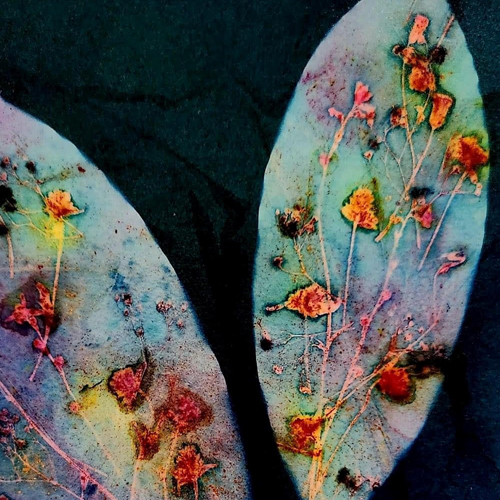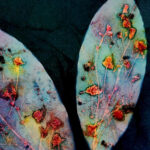'Noctalgia', 'This World Always Offers Reasons for Despair', and 'What the Insomniac Thinks'
Poetry
by Katherine Riegel
Noctalgia
The loss of dark skies is so painful, astronomers coined a new term for it
—headline 9/17/23
The country of my own past
seems oceans away, or just one step
under a mossy lintel into a fantasy
world I might have read in a book
held under my desk in eighth grade
before the teacher gently noted
even earnest kids like me needed
to pay attention in class. Kids like me
who weren’t rich in money—
and how much that mattered
in the ‘80s, decade of Reaganomics
and bewildering designer brands—but
were college bound on brains and family
expectation. Page 172: a girl who likes
dogs and horses better than people
walks with friends across the campus
quad, the dark wind of October
blowing their eyes bright, hopeful.
Page 378 (I read long books):
students crowd a ping-pong table,
laptop keys clicking, asking questions
before they send their fledgling words
into the ether. Page 26: a raccoon kit
reaches into the rubber boot
of a ringleted child, barn door
open behind them. Please don’t ask
about the 500s, when the protagonist’s
sister dies and her last hope for wings
withers in hard frost. I honestly don’t
want to make page 1000 with the world
as it is and my genetic inheritance
of fearful unrecognition, mind
gone awry inside a body that just
won’t die. But perhaps the next
200 pages or so could contain
some green ease, less pain, more
floating. I try to remember I can
only read one page at a time
and shouldn’t this be the one
where the once-girl is happy? I wish
for one of those weighted bookmarks
so lead-heavy they fall through
time so I can start the book again,
remembering to remember every
tender equine nose smelling of sweet
alfalfa, every sharp spark rising
into the distant, glittering sky.
This World Always Offers Reasons for Despair
war again in places where
people already have too many stones
children suffering like the dog
I saw a man hitting with a metal rod
at the off-leash park that’s usually
my haven
how can we take care of them?
in my own head a wrongness a well
endless and raw nothing dropped
will ever hit bottom I am not
even sad just lost to myself or
rather part of me curls on the blue
linoleum of my childhood kitchen
pain boiling over on the stove
this morning late October
the light creeping down
sideways as if reluctant
to touch our earth
my legs carrying me undirected
(automatic like some guns) because
my dogs must be walked
lest they break the peace of the house
I spot a blue jay
sky-colored strident far from innocent
why was that ravenous bird made
so beautiful I do not want to love it
What the Insomniac Thinks
When my shoulders touch the sheets, the sleep
that had rubbed its warm fur against my ankles
while I sat on the couch after dinner
dissolves. So my mind takes up this challenge
and posits humans eating hot wings because we
want to fly, and suddenly there’s a woman chasing
moths and stuffing them in her mouth, her body
hollowing, attracting fairy dust. And do we
eat fish to belong in the cradle of water,
potatoes to know the darkness
with its roads of mycorrhizae connecting
everything? And how many of us have wondered
if fungus underlies existence, mushroom trips
showing exactly what’s real? Some time later
beings of light—clear vessels filled with magnitude—
bend over me as I garden, hold my hands
holding the trowel, as if to make sure what grows
is right and good and even magic. How else
to describe the profound strangeness that is sleep
but as a sort of magic, a compost
in which we deposit the scraps of the waking world
and hope for the nourishment we need to go on?

About the Author
Katherine Riegel’s lyric memoir, Our Bodies Are Mostly Water, is forthcoming from Cornerstone Press in summer 2025. She is also the author of Love Songs from the End of the World, the chapbook Letters to Colin Firth, and two more books of poetry. Her work has appeared in Brevity, Catamaran, One, Orion and elsewhere. She is managing editor of Sweet Lit and teaches online classes in poetry and creative nonfiction. Find her at katherineriegel.com.
About the Artist
Tena Smith is a multidisciplinary artist whose work in a variety of mediums has been showcased and sold in multiple galleries and boutiques across the state of Florida since 2007. Her love of experimental techniques can be seen in much of her work no matter the medium. Finding endless joy in the creative process and problem solving, it is the journey that drives her more so than the end result. She believes that sharing that journey with others in the hope of inspiring them to find their own unique voice is where true success lies. She describes her cyanotype process at Alternative Photography and she posts on Instagram as @tenasmithdesigns.


